ASUS' N82Jv: Jack-Of-All-Trades
by Jarred Walton on September 11, 2010 11:10 PM ESTASUS N82Jv-X2 General Performance
We've been through this before, and our test suite remains the same as in recent laptop reviews, so let's jump right in and see how the N82Jv fares. Two key matchups are highlighted in the charts: the M11x R2 that has the same GPU but a slower ULV CPU, and the Toshiba A660D that represents something of the high water mark for current AMD notebooks.
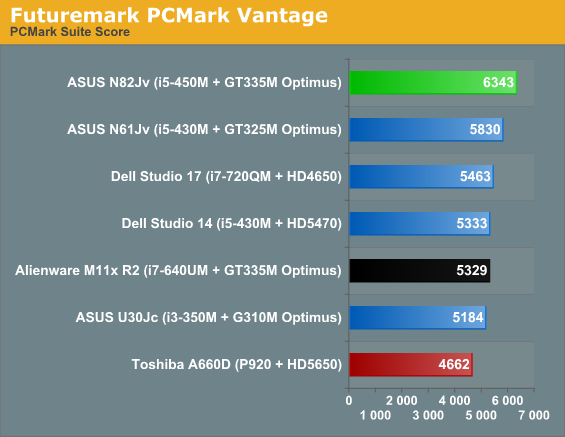
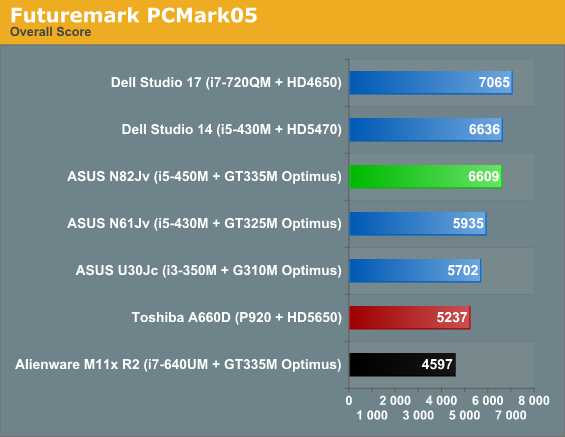
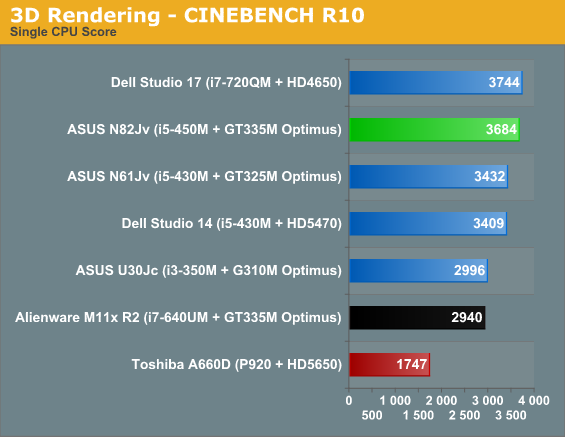
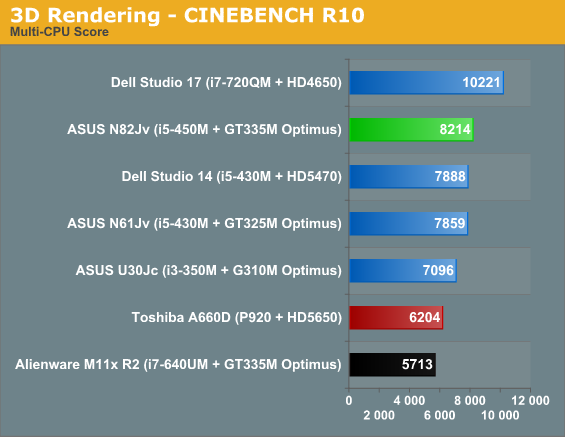
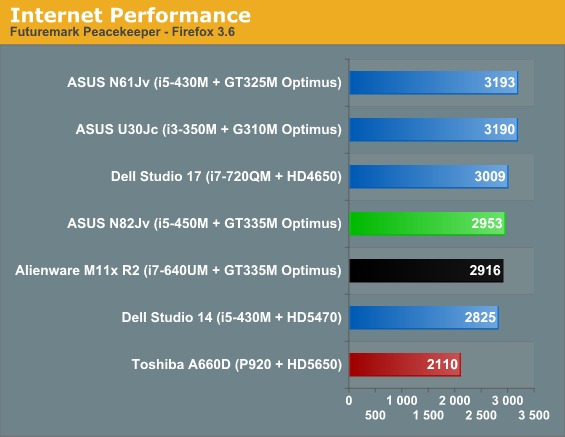
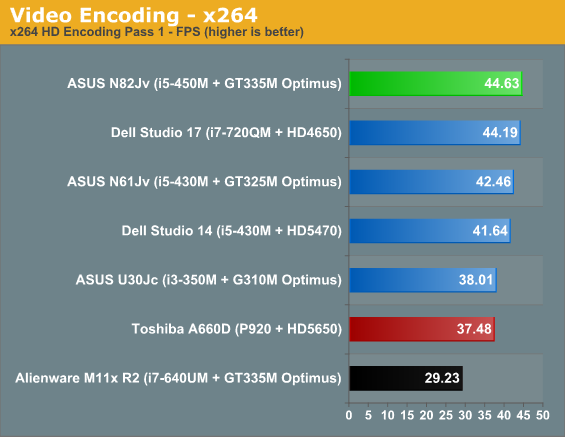
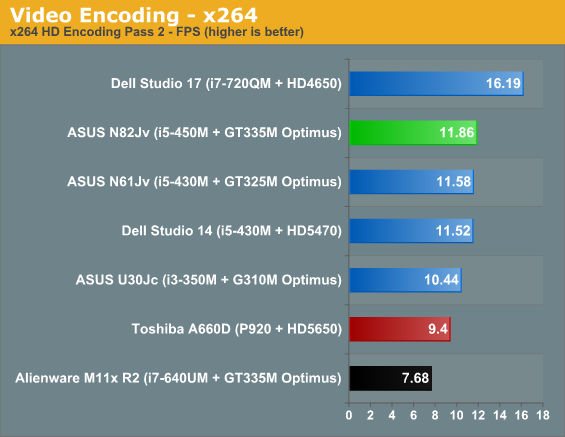
Right from the start, our two key comparisons show the N82Jv in a favorable light. Starting with the M11x R2, PCMark05 has the N82Jv leading the by 44%, while the Vantage result is "just" 19% higher. The close result of the M11x in Peacekeeper is an oddity…as is the loss to the slower clocked CPU/GPU of the N61Jv. It could be minor differences in the driver department, or perhaps the latest 3.6.8 Firefox updated reduced Peacekeeper performance. Regardless, we ran the test numerous times but the result was always lower than expected (and yet similar to the Studio 14). Peacekeeper is the exception to the rule, however. Cinebench gives the N82Jv a 25%/44% lead in the 1CPU/SMP tests, and the lead in x264 is just over 50% in both passes.
The comparison to the A660D leaves no question as to which processor is superior, with the lowest margin of victory coming at 20% in the first pass x264 encode—a test that's traditionally more HDD/bandwidth bound. PCMark has the N82Jv ahead by 36% in Vantage and 26% in 05, Peacekeeper gives the N82Jv a 40% lead, the single CPU Cinebench result is more than twice as fast as the P920, and the lead in multi-threaded tasks ranges from 20% to just over 30%. This is something we pointed out in the A660D review: when AMD's quad-core P920 can't come up with some clear wins over the i3-330M, it's a tough sell. Obviously, the i5-450M is faster than the 330M and simply increases Intel's lead; AMD's 2.0GHz N930 should come a lot closer to the Intel results in multi-threaded applications, but anything slower than that really needs to go after the value proposition.
Looking at the nearly identically equipped (outside of the GPU) Dell Studio 14, the N82Jv places about where we'd expect. The Vantage result favors ASUS by 19%, PCMark05 is a tie, but the remaining tests all give ASUS a lead of around 5% (give or take). It looks like ASUS has managed to better optimize the system performance, either with tighter memory timings, more BIOS tuning, or other tweaks. 5% is hardly anything to get worked up about, but it does show ASUS pays attention to some areas of performance more than many larger OEMs. $100 more for better performance, a significantly faster GPU, plus Optimus and USB 3.0 on top of that? Unless you can get the Studio 14 for a lot less than $900 for our tested system, the N82Jv is clearly a better choice.










33 Comments
View All Comments
JarredWalton - Monday, September 13, 2010 - link
See page two... added the HWMonitor screenshot and some commentary (similar to the above).The Crying Man - Monday, September 13, 2010 - link
Really? Why shouldn't people play games on notebooks? I've been doing it for over 8 years without problems.seanleeforever - Monday, September 13, 2010 - link
gaming on a laptop is full of compromises. you never get a powerful enough CPU/GPU without paying penalty of weight/battery life/heat/noise/price. and two years later, you laptop is out of date and you have NO ABILITY to upgrade it.i am no stranger to notebook gaming. i had that very goal when i entered college (which was many, many years ago). i bought the most powerful notebook with best graphic card available. the system cost over 2k with coupons (which was VERY expensive, i might add). it was high price/heavy weight (5.2 lbs)/heats up like crazy, and poor battery life. it was out of date by the 3rd year in college and barely run any new games with decent settings.
Then, i bought another one (T61P) when it came out, again, the best graphic card in business and expensive like hell. it run games great in that year, but now cannot even run SC2 with medium settings.
the inability to upgrade is really what kills it. when you buy notebooks, you are paying more than Ram/HDD/CPU/GPU. you are paying the whole package. buying a gaming laptop means once the CPU/GPU is out of date, you gonna have to throw the whole thing out, no matter how great the monitor you have, no matter how good the keyboard is, no matter how awesome the system was designed. Notebook manufacture knows about it. they cheapens the design in other areas because they know you gonna move to new gears once Intel/AMD/Nv's new chip is out. long term reliably is no longer a concern (HP, i am looking at you). long term engineering test is complete out of the window because all it matters is to ship the units with the newest chip (the ENTIRE NV lineup were overheating, any body?)
i really love the way desktop works. i can dump a lot of money on a good monitor, keyboard, mouse, cage, audio, and knowing those parts are staying with me no matter i upgrade my system to i7 or i70.
the only thing that keep pushing for new notebooks are games. i can hardly find any reason to dump my T61P besides gaming performance. the new i7 cores are also extremely good (i only have i7 620lm, but it runs 1080 video, VHDL simulation, and matlab code without a problem). so this time around i dumped money into a well designed, ultra portable tablet with one of the best screen in business that i know i will use for the next 5 years. meanwhile i can built myself a gaming machine if i wanted for 30% of the cost.
JarredWalton
believe or not, a lot of people buying notebook not for gaming. i know anand has received a lot of computers in the past, why not create a lab to test
1: sound quality? fan noise?
2: screen quality? (like, take picture from all angels and compare it to others), screen reflection. out door view experience.
3: actual portability. when you travel (the reason for thin and light notebook), you want to work on the go. does the position of the fan make it easily blocked when playing on your lap or other soft surfaces? does it make machine overheat? effect on fan noise?
4. ease to use, such as how accessible is to the HDD and RAM? how difficult it is to do a full on re-store to factory setting? how about drivers support if your HDD is broken and you do not have a DVD shipped with system? how easy to make back on your person files using the provided tool? and how about notebook specific functions (like, if you have thinkpad, you have thinkvantage software that actually does some nice things such as check your system health, check your drivers and install them automatically).
my whole point is that there is SO MUCH MORE to tell other than your new notebook can run crysis and last 5 hours. in fact, gaming performance is maybe what i care the least because as soon as i see the GPU and CPU, i have a good feeling of what this can and cannot do. the Toshiba one is nicely done to point out the crapware that came pre loaded.